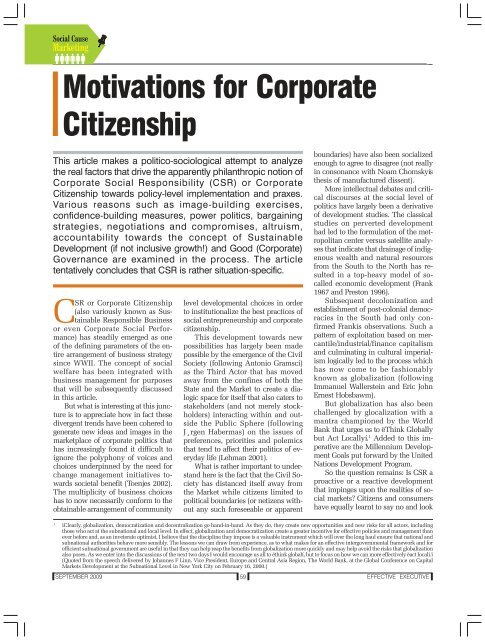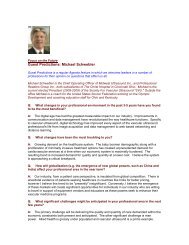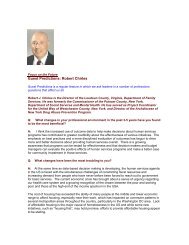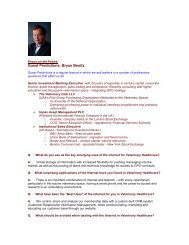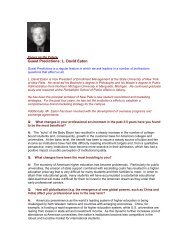Social Cause Marketing - The Regis Group Inc
Social Cause Marketing - The Regis Group Inc
Social Cause Marketing - The Regis Group Inc
You also want an ePaper? Increase the reach of your titles
YUMPU automatically turns print PDFs into web optimized ePapers that Google loves.
Motivations for Corporate<br />
Citizenship<br />
This article makes a politico-sociological attempt to analyze<br />
the real factors that drive the apparently philanthropic notion of<br />
Corporate <strong>Social</strong> Responsibility (CSR) or Corporate<br />
Citizenship towards policy-level implementation and praxes.<br />
Various reasons such as image-building exercises,<br />
confidence-building measures, power politics, bargaining<br />
strategies, negotiations and compromises, altruism,<br />
accountability towards the concept of Sustainable<br />
Development (if not inclusive growth!) and Good (Corporate)<br />
Governance are examined in the process. <strong>The</strong> article<br />
tentatively concludes that CSR is rather situation-specific.<br />
CSR or Corporate Citizenship<br />
(also variously known as Sustainable<br />
Responsible Business<br />
or even Corporate <strong>Social</strong> Performance)<br />
has steadily emerged as one<br />
of the defining parameters of the entire<br />
arrangement of business strategy<br />
since WWII. <strong>The</strong> concept of social<br />
welfare has been integrated with<br />
business management for purposes<br />
that will be subsequently discussed<br />
in this article.<br />
But what is interesting at this juncture<br />
is to appreciate how in fact these<br />
divergent trends have been cohered to<br />
generate new ideas and images in the<br />
marketplace of corporate politics that<br />
has increasingly found it difficult to<br />
ignore the polyphony of voices and<br />
choices underpinned by the need for<br />
change management initiatives towards<br />
societal benefit (Toenjes 2002).<br />
<strong>The</strong> multiplicity of business choices<br />
has to now necessarily conform to the<br />
obtainable arrangement of community<br />
level developmental choices in order<br />
to institutionalize the best practices of<br />
social entrepreneurship and corporate<br />
citizenship.<br />
This development towards new<br />
possibilities has largely been made<br />
possible by the emergence of the Civil<br />
Society (following Antonio Gramsci)<br />
as the Third Actor that has moved<br />
away from the confines of both the<br />
State and the Market to create a dialogic<br />
space for itself that also caters to<br />
stakeholders (and not merely stockholders)<br />
interacting within and outside<br />
the Public Sphere (following<br />
J¸rgen Habermas) on the issues of<br />
preferences, priorities and polemics<br />
that tend to affect their politics of everyday<br />
life (Lehman 2001).<br />
What is rather important to understand<br />
here is the fact that the Civil Society<br />
has distanced itself away from<br />
the Market while citizens limited to<br />
political boundaries (or netizens without<br />
any such foreseeable or apparent<br />
boundaries) have also been socialized<br />
enough to agree to disagree (not really<br />
in consonance with Noam Chomskyís<br />
thesis of manufactured dissent).<br />
More intellectual debates and critical<br />
discourses at the social level of<br />
politics have largely been a derivative<br />
of development studies. <strong>The</strong> classical<br />
studies on perverted development<br />
had led to the formulation of the metropolitan<br />
center versus satellite analyses<br />
that indicate that drainage of indigenous<br />
wealth and natural resources<br />
from the South to the North has resulted<br />
in a top-heavy model of socalled<br />
economic development (Frank<br />
1967 and Preston 1996).<br />
Subsequent decolonization and<br />
establishment of post-colonial democracies<br />
in the South had only confirmed<br />
Frankís observations. Such a<br />
pattern of exploitation based on mercantile/industrial/finance<br />
capitalism<br />
and culminating in cultural imperialism<br />
logically led to the process which<br />
has now come to be fashionably<br />
known as globalization (following<br />
Immanuel Wallerstein and Eric John<br />
Ernest Hobsbawm).<br />
But globalization has also been<br />
challenged by glocalization with a<br />
mantra championed by the World<br />
Bank that urges us to ëThink Globally<br />
but Act Locallyí. 1 Added to this imperative<br />
are the Millennium Development<br />
Goals put forward by the United<br />
Nations Development Program.<br />
So the question remains: Is CSR a<br />
proactive or a reactive development<br />
that impinges upon the realities of social<br />
markets? Citizens and consumers<br />
have equally learnt to say no and look<br />
1<br />
ìClearly, globalization, democratization and decentralization go hand-in-hand. As they do, they create new opportunities and new risks for all actors, including<br />
those who act at the subnational and local level. In effect, globalization and democratization create a greater incentive for effective policies and management than<br />
ever before and, as an inveterate optimist, I believe that the discipline they impose is a valuable instrument which will over the long haul ensure that national and<br />
subnational authorities behave more sensibly. <strong>The</strong> lessons we can draw from experience, as to what makes for an effective intergovernmental framework and for<br />
efficient subnational government are useful in that they can help reap the benefits from globalization more quickly and may help avoid the risks that globalization<br />
also poses. As we enter into the discussions of the next two days I would encourage us all to ëthink globalí, but to focus on how we can more effectively ëact localí.î<br />
(Quoted from the speech delivered by Johannes F Linn, Vice President, Europe and Central Asia Region, <strong>The</strong> World Bank, at the Global Conference on Capital<br />
Markets Development at the Subnational Level in New York City on February 16, 2000.)<br />
SEPTEMBER 2009<br />
59<br />
EFFECTIVE EXECUTIVE


